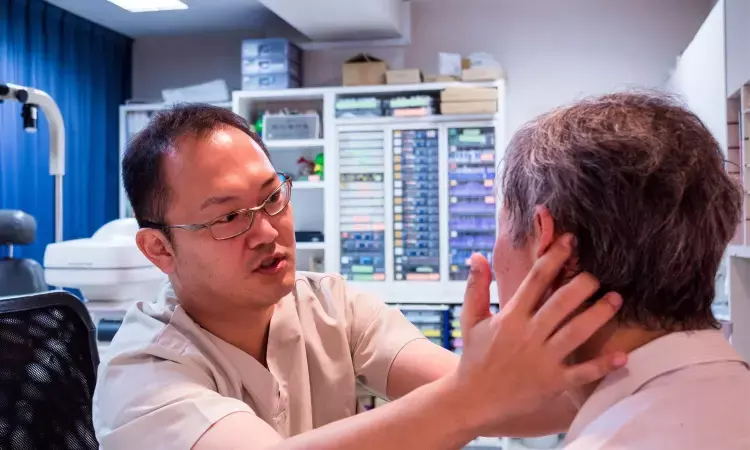- Home
- Medical news & Guidelines
- Anesthesiology
- Cardiology and CTVS
- Critical Care
- Dentistry
- Dermatology
- Diabetes and Endocrinology
- ENT
- Gastroenterology
- Medicine
- Nephrology
- Neurology
- Obstretics-Gynaecology
- Oncology
- Ophthalmology
- Orthopaedics
- Pediatrics-Neonatology
- Psychiatry
- Pulmonology
- Radiology
- Surgery
- Urology
- Laboratory Medicine
- Diet
- Nursing
- Paramedical
- Physiotherapy
- Health news
- Fact Check
- Bone Health Fact Check
- Brain Health Fact Check
- Cancer Related Fact Check
- Child Care Fact Check
- Dental and oral health fact check
- Diabetes and metabolic health fact check
- Diet and Nutrition Fact Check
- Eye and ENT Care Fact Check
- Fitness fact check
- Gut health fact check
- Heart health fact check
- Kidney health fact check
- Medical education fact check
- Men's health fact check
- Respiratory fact check
- Skin and hair care fact check
- Vaccine and Immunization fact check
- Women's health fact check
- AYUSH
- State News
- Andaman and Nicobar Islands
- Andhra Pradesh
- Arunachal Pradesh
- Assam
- Bihar
- Chandigarh
- Chattisgarh
- Dadra and Nagar Haveli
- Daman and Diu
- Delhi
- Goa
- Gujarat
- Haryana
- Himachal Pradesh
- Jammu & Kashmir
- Jharkhand
- Karnataka
- Kerala
- Ladakh
- Lakshadweep
- Madhya Pradesh
- Maharashtra
- Manipur
- Meghalaya
- Mizoram
- Nagaland
- Odisha
- Puducherry
- Punjab
- Rajasthan
- Sikkim
- Tamil Nadu
- Telangana
- Tripura
- Uttar Pradesh
- Uttrakhand
- West Bengal
- Medical Education
- Industry
Lanadelumab may prove effective prophylactic therapy for hereditary angioedema

Hide et al., and colleagues recently demonstrated the effectiveness of lanadelumab in preventing attacks of hereditary angioedema (HAE) in Japanese patients with HAE type I/II. The safety and Efficacy of lanadelumab in Japanese patients is consistent with the findings from global phase 3 studies of lanadelumab in adults and adolescents.
Dr Isao Ohsawa is the co-author of this study, Efficacy and safety of lanadelumab in Japanese patients with hereditary angioedema: A phase 3 multicenter, open-label study published in the Journal of Dermatology.
There needs to be more data regarding the safety and Efficacy of lanadelumab in preventing HAE in Japanese patients. The present study reported outcomes from a phase 3, multicenter, open-label study of lanadelumab in these Japanese patients.
The study enrolled those Japanese patients with a history of HAE aged ≥12 years with ≥1 investigator-confirmed HAE attack during the 4-week run-in baseline period.
The enrolled patients received lanadelumab 300 mg every two weeks subcutaneously for 52 weeks.
During the second 26-week treatment period, patients with well-controlled symptoms (e.g., attack-free) for six months could have their dose reduced to 300 mg every four weeks. The primary efficacy endpoint was no investigator-confirmed HAE attacks (attack-free status) during days 0–182. Other outcomes included the rate of investigator-confirmed HAE attacks per month (28 days) and lanadelumab safety.
The key points of this study are:
- Researchers enrolled 12 patients with a mean age of 41 years.
- Five patients, constituting nearly 41 %, were attack-free during the first 26 weeks.
- There was a reduction in mean ± SD HAE attack rate per month by 74.0%, from 3.8 ± 2.4 during baseline to 1.2 ± 2.6 during the overall 52-week treatment period.
- They did not record any deaths or discontinuations.
- There were no recordings of treatment-emergent adverse events (TEAEs), severe or serious TEAEs related to lanadelumab, or positive anti-drug antibody results.
- A total of 37 events occurred in six patients, with the most frequent TEAEs being injection-site reactions of mild severity.
Based on this study's results, they said we support the findings from two global phase 3 studies for lanadelumab use as prophylactic therapy in Japanese patients with a history of HAE.
The study bridged the gap between data on the global lanadelumab outcomes and the outcomes in Japanese patients with HAE.
Our study had limitations like fewer patients, limited interpretation of the dosing subgroup analysis, etc.
Takeda Pharmaceutical Company Limited sponsored the study. The company was involved in designing and conducting the study, data analysis and review.
Further reading:
BDS, MDS in Periodontics and Implantology
Dr. Aditi Yadav is a BDS, MDS in Periodontics and Implantology. She has a clinical experience of 5 years as a laser dental surgeon. She also has a Diploma in clinical research and pharmacovigilance and is a Certified data scientist. She is currently working as a content developer in e-health services. Dr. Yadav has a keen interest in Medical Journalism and is actively involved in Medical Research writing.
Dr Kamal Kant Kohli-MBBS, DTCD- a chest specialist with more than 30 years of practice and a flair for writing clinical articles, Dr Kamal Kant Kohli joined Medical Dialogues as a Chief Editor of Medical News. Besides writing articles, as an editor, he proofreads and verifies all the medical content published on Medical Dialogues including those coming from journals, studies,medical conferences,guidelines etc. Email: drkohli@medicaldialogues.in. Contact no. 011-43720751


